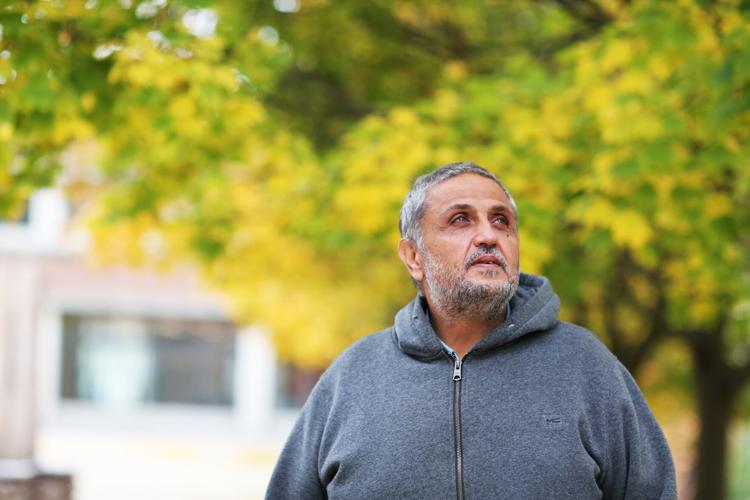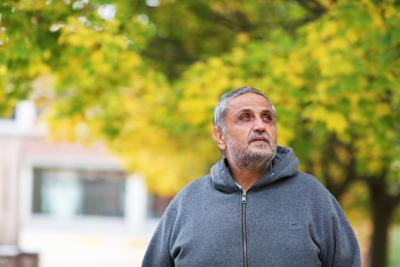Professor Ahmed Abu Shaban cannot stop thinking of his students back home in Gaza. Many are dead, many starving, almost all of them living in tents or worse.
And so he returns to them, virtually from his office in York University, recording lectures for them, for which they travel, sometimes at great peril, to gain strong enough internet connection to watch.
“I feel responsible for my students,” said Abu Shaban. “I cannot give up. And neither can they. They have no other option. This is their life. And they are the hope for the future. I see it in every one of my students.”Â
A year ago Abu Shaban was a dean at Al-Azhar University in Gaza City.Â
Now, there are no universities left standing in Gaza, not since January. But with the help of Abu Shaban there is still scholarship.Â
Fourteen thousand students were enrolled at Al-Azhar last September before it was destroyed. Ten thousand have since registered for online courses taught by Abu Shaban and his colleagues. After a day of teaching at York, Abu Shaban spends his nights grading assignments from Gaza or sitting on a master’s thesis defence committee.
Israel says it attacked Gaza’s universities for the same reason it damaged or destroyed the territory’s hospitals. It says Hamas had military bases near or within them. Al-Azhar, the Israeli military said, . UN experts have  Israel launched its attack in Gaza after Hamas raided southern Israel in October last year, killing 1,200 people, civilians, mostly, and taking 240 more hostage. According to the Gaza health ministry, 43,500 Palestinians have been killed in the months since.Â
In Gaza, where Israel has long controlled and limited travel, education is freedom.Â
This is why Abu Shaban persists, working night and day, pressed on by the weight of 10,000 dreams.Â
Last summer, Abu Shaban’s star pupil Bilal Ayesh finished his undergrad at Al-Azhar in agricultural sciences. The school’s finances were tight but Abu Shaban fought for Ayesh to stay on as a lab instructor while he pored over scholarship opportunities at institutions abroad.
Last September, Ayesh stopped by Abu Shaban’s office. Now that the world was finally open to him, Ayesh asked whether it would be better to apply for a postgraduate program in America or another in Germany.
Abu Shaban said that in Ayesh’s eyes he saw the future — Gaza and Al-Azhar’s — and it was marvellous.
“At the time I thought, ‘With students like him, we can really hope for a good future, for us and our institution,’” said Abu Shaban.
Abu Shaban saw his own past, too — graduating from that very university, earning a doctorate in Germany and postdoctorate position in Wisconsin, before returning to teach in Gaza.
“I was looking in his eyes and I saw him sitting in my seat in the future,” he said. “And I would be happy to see him, his generation, take it.”
One month later, Ayesh was killed.
Two months later, Al-Azhar was blown apart by bombs.
Abu Shaban, now a refugee, fled his home with his family, fearing they would never return. After Israel’s siege and bombardment campaign, Gaza City is uninhabitable, and could remain so for years.Â
Abu Shaban leveraged academic connections to secure a lifeline to É«É«À², where he now teaches courses at York University’s faculty of environmental and urban change, as well as its faculty of liberal arts and professional studies as a visiting professor.
Death can come at any moment for his students in Gaza.Â
“We had several students who were killed while seeking internet connection,” said Abu Shaban. “But you cannot say they were killed because of education. They were killed because they were in Gaza.”
Abu Shaban pointed to the story of Shaaban al-Dalou, an Al-Azhar software engineering student whose final moments circulated around the world last month in  when he was burned to death while sheltering at a hospital. The Israeli military bombed what it said was a Hamas command centre nearby, which it said triggered the fiery explosion at the hospital that consumed al-Dalou.
“If we stop education, we might as well stop living,” said Abu Shaban. “Education is as important as food and water.”
During midterms, the house of Salim Maarouf, one of Abu Shaban’s students, was destroyed. The blast injured his back, hospitalizing him and his family. Then, Israel invaded Gaza City.
“His family, they had no place to go,” said Abu Shaban. “Tanks were surrounding the hospital. And this student was messaging me, asking about a topic that was not included in the lecture, wondering if he could bring it up in the midterm exam.”
Maarouf completed his exam from the hospital.Â
Abu Shaban now teaches three courses at York and five in Gaza.Â
“He’s teaching a full course load here and more than a full load back there across a spectrum of different subject matter,” said Philip Kelly, a York professor and associate dean who helped appoint Abu Shaban. “And I know he has also filled in for colleagues who have either been killed or who cannot teach for one reason or another.”
Many of Abu Shaban’s peers in Gaza remain trapped in the war zone, where their days are structured around searching for food, potable water, maybe some meagre source of income, before risking their lives to connect to the internet.Â
Abu Shaban’s work is , which provides scholarships for students in Gaza.Â
Abu Shaban said his colleagues at York have been supportive of his online work, some even offering to help teach. But the courses are in Arabic, shrinking the pool of assistance. Â
“One thing I’ve learned from talking to him about his situation is that universities are communities, not buildings,” said York associate professor Carlota McAllister. “That’s a lesson for all of us.”Â



























